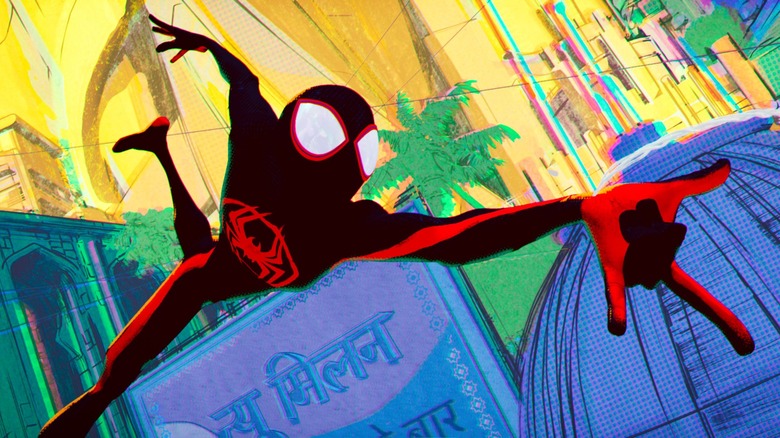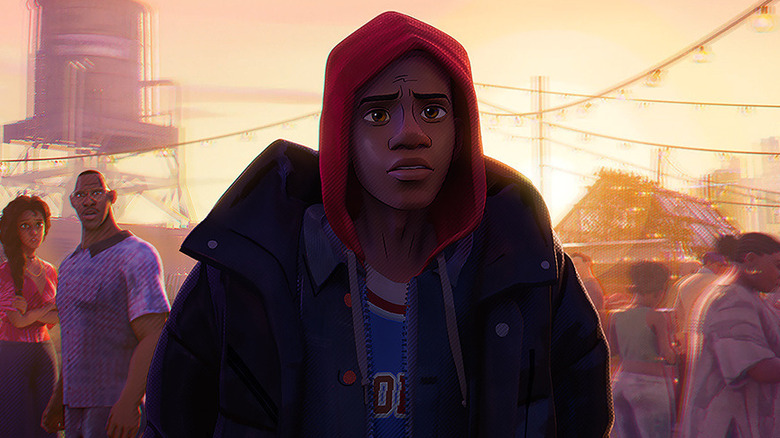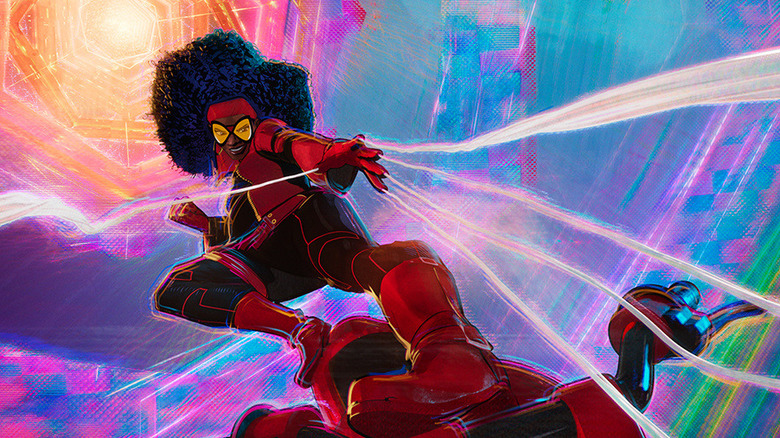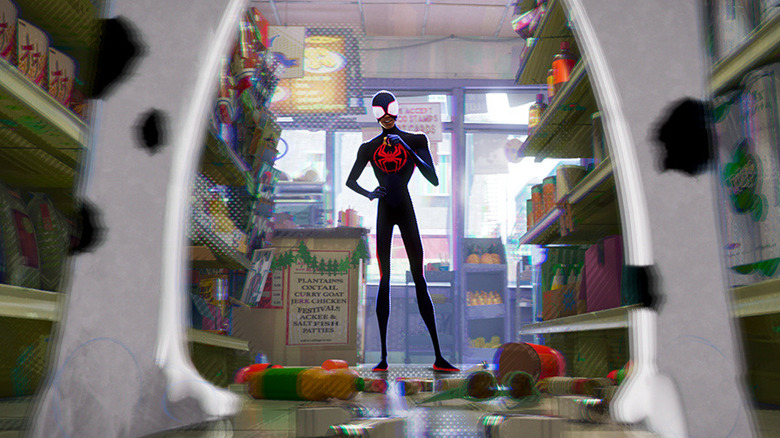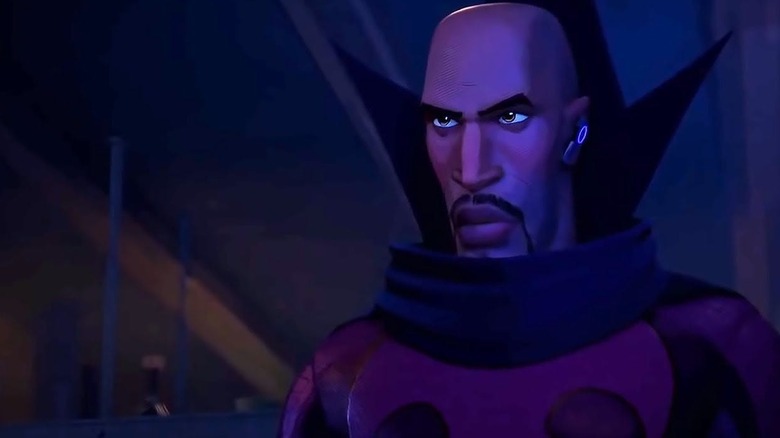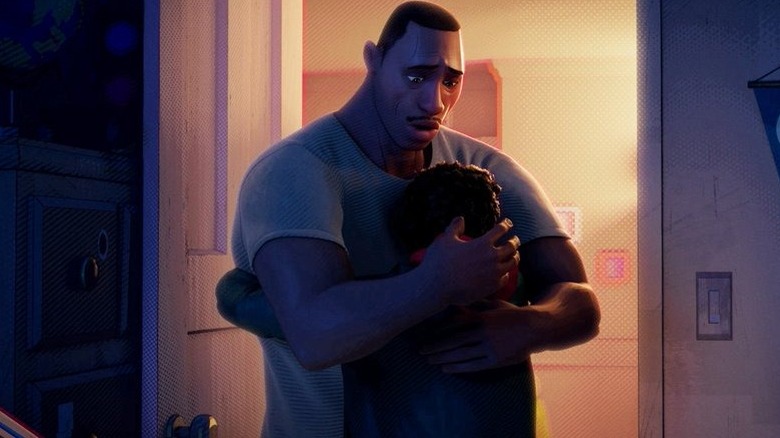Spider-Man: Across The Spider-Verse's Most Confusing Moments Explained
As a sequel to "Into the Spider-Verse," Phil Lord and Christopher Miller's latest feat of animation isn't just twice the size as its predecessor — it's exponentially bigger in terms of its scope. That's speaking not just in terms of the ambitious animation and art style, but the story, too. And when it comes to story, "Across the Spider-Verse" tries to fit in a lot of information into not quite two and a half hours of runtime.
Over a year after the events of the first "Spider-Verse," Miles Morales (Shameik Moore) is caught between juggling family struggles and tracking down D-list villain The Spot (Jason Schwartzman) in a classic "Spider-Man" dilemma. When he is suddenly visited by Gwen (Hailee Steinfeld), Miles is thrust into another multiverse adventure. Soon, he discovers Gwen is working with a group of dimension-hopping Spider-People to help keep the Spider-Verse stable. This initiative is led by Miguel O'Hara, aka Spider-Man 2099 (Oscar Isaac), who is keeping a huge secret from Miles.
In the end, some developments and complications will certainly leave some fans confused. Other decisions don't make a lot of sense upon a first watch and require a second viewing to fully process. Regardless of where your hiccups lie, we are here to explain the most confusing moments in "Spider-Man: Across the Spider-Verse."
How is Miles grounded if he lives at school?
One of the more mundane conflicts in "Across the Spider-Verse" is also one of the first places where audiences might get a bit confused. When Miles shows up late to his dad's promotion party, he gets into it with both his parents and ends up grounded. The only problem with this is that Miles doesn't live with his parents ... at least not full time.
The concept of being grounded means your parents have the power to restrict you from having a social life or doing anything beyond going to school and studying. But in the case of Miles Morales, he lives in a dorm at Visions during the weekdays — at least that's the case in the first "Spider-Verse." Miles takes it pretty seriously, then, when his parents say he is grounded for a month. Even if he wasn't Spider-Man, wouldn't Miles be living without their supervision most of the time anyway? So, what's the point of grounding him?
The point of this sequence is to raise the emotional stakes between Miles and his parents in a relatable way. In this way, it makes sense and succeeds in grounding (pun intended) Miles as a character who is starting to grow into his later teen years. It sets up the thematic stakes of not just this movie, but the next one in the series as well.
Why does Miles' mom let him go out?
Right after his parents decide to ground him (for two months, mind you) Rio Morales (Luna Lauren Velez) observes that Miles has a genuine connection to Gwen and lets him go out instead. So, what gives? Why does Miles' mom go behind his dad's back?
The choice makes sense given the movie's focus on giving Rio Morales more to do than she gets in the first film. While she is barely a character in "Into the Spider-Verse," this moment allows her to make decisions and have agency apart from Jefferson (Brian Tyree Henry). This choice also comes after Rio gives a touching speech inspired by writer Phil Lord's real experience about how she's spent her whole life protecting Miles from the world. "Across the Spider-Verse" acknowledges that part of a coming-of-age story is parents recognizing that they have to start to let go and trust their kids. Rio Morales has begun to accept this, while Miles' dad might never.
In the end of the movie when Miles doesn't realize he is in an unknown universe, he finally decides to fess up. Importantly, he chooses to tell his mom that he is Spider-Man. Because she shows more fluency in Miles' emotions earlier in the story, he feels that he can open up to her, and the audience understands why he's more comfortable sharing his spider-secret with his mom than his dad. This makes the following dramatic twist hit that much harder.
Is Miguel a hero or a villain?
Introduced to this cinematic universe in the end credits sequence of "Into the Spider-Verse," Miguel O'Hara appears for real in "Across the Spider-Verse." Spider-Man 2099 is a dimension-hopping Latino Spidey who, having made his comics premiere in 1992, is the first bi-racial take on the superhero. He is also the de facto leader of the group of Spider-People that makes sure the Spider-Verse stays intact. But what exactly is his deal?
Between his Spider-Man 2099 powers, claws, tendency to shift into animalistic shapes, and his menacing red eyes, it's not clear whether we are supposed to trust Miguel or fear him. It's joked about that he might be a vampire, a reference that gives us real "Morbius" vibes, but his true nature and backstory are kept mysterious throughout much of "Across the Spider-Verse."
In a scene where Miguel needs to inject himself with a mystery fluid to maintain his strength, his eyes turn red immediately after. His comics origin involves the character getting addicted to a chemical drug, so this may very well be a twist on that story. Regardless, it's clear that the morality of Spider-Man 2099 will be a continued plot thread in the next entry in the "Spider-Verse" saga.
Why does Miles see visions of the Spot after the explosion?
The second half of "Across the Spider-Verse" finds Miles, Gwen, and the rest of the Spider-People chasing the Spot as he tries to grow powerful enough to defeat Spider-Man. Traveling from one universe's main Alchemax building to the next, he recreates the chemical explosion that originally turned him into a villain in a bid to grow to an even higher power level. Eventually, the heroes catch up to The Spot, but they are too late. In trying to stop him, Miles gets caught in the explosion and sees a flash of images. This moment acts as the catalyst for the visions that Miles sees for the rest of the movie.
In a couple of instances during the last parts of "Across the Spider-Verse," Miles sees visions of The Spot and some vague glimpses of the future. While we don't know for sure what's going on, there is definitely more significance to this event that isn't being talked about yet. Something clearly happens to Miles in this moment that connects him to The Spot.
What is a canon event?
There is quite a bit of exposition in the middle of "Across the Spider-Verse." Many important ideas are communicated to Miles — and by extension, the audience — for the first time and some of them are sure to go over the average viewer's head. The big, confusing one here is the idea of a "canon event." Comic book nerds might intuit that this has to do with canonicity — that is, adherence to an established, official version of a fictional history that maintains consistency across a shared universe – but the term itself isn't evocative beyond that.
"Across the Spider-Verse" emphasizes that certain events are meant to define a Spider-Person's life. These events are supposed to happen, in some shape or form, to every Spider-Person. These are canon events, and most often they occur in the form of a tragedy — the death of the mentor figure or lover, for example. These are character-defining details that have been twisted and applied to each version of the character throughout decades of comics.
For the Peter Parker of Earth-616, these tragedies are the losses of Uncle Ben and Gwen Stacy. But even in a universe where Gwen survives, that universe's Spider-Man still has their equivalent to Gwen. According to Miguel, if you stop one of these from happening, your universe will eventually fall apart. Miles is willing to put that theory to the test by trying to save his dad from his impending death, despite it being pre-ordained as one of his "canon events."
What is the significance of captains?
Not only does "Across the Spider-Verse" introduce the concept of canon events, but it also immediately complicates it by giving Miles knowledge of the future. He wants to jump back into his timeline and stop his dad's supposedly inevitable death, but Miguel shuts him down by trapping him. When Gwen realizes Miles' dad is supposed to die after becoming a police captain, she realizes her own father's fate could be the same.
The death of Captain Stacy is a canonical event that happens in a few major Peter Parker stories and, for obvious reasons, also has a major impact on Gwen Stacy's history. On Earth-616, it preludes an even bigger death — Gwen's. Meanwhile, the death of Miles' dad, Jefferson Davis, is a defining moment for that character in Insomniac's "Spider-Man: Miles Morales" video game (via YouTube). "Across the Spider-Verse" parallels these two losses and even presents the option that they might be preventable. By using a promotion to captain as symbolic of a death sentence, the movie once again draws a parallel between the stories of Gwen and Miles.
Right before Gwen's dad is killed, it is shown that he's promoted to Captain, which mirrors Jefferson's promotion. These two fates are tied together. In the end, it seems like Gwen has saved her dad from taking the promotion by revealing she is Spider-Woman. This suggests that perhaps Miles can save his father by telling him the truth.
Was Miles not supposed to be Spider-Man?
"Across the Spider-Verse" expands upon and solidifies the idea that there is only meant to be one Spider-Person per universe. This makes Miles Morales an anomaly, by definition, which puts him between a rock and a hard place by the end of the movie. You see, Miles is a second Spider-Man in a world that was only supposed to have one — the Peter Parker that died in the beginning of "Into the Spider-Verse." But by getting bitten by a radioactive spider from another dimension, Earth-42, Miles Morales apparently became an individual who isn't supposed to exist in the makeup of the Spider-Verse.
What this movie establishes is that every universe has its own Spider-Person, and they have a predetermined destiny. Miles Morales was never part of the Spider-Verse's plan. Gwen knows more than she lets on about this for the entire movie and, retroactively, you see why she has been so distant and so caring at the same time. She knows Miles wouldn't have been able to just accept the news about his dad without trying to intervene, making the inevitable reveal of her knowledge even more heartbreaking.
Miles was never meant to be Spider-Man and not only did his presence get Peter Parker killed, it created a universe where there is no Spider-Man. "Across the Spider-Verse” only begins to scratch the surface of what that world could look like.
Why doesn't Miles realize he's in the wrong universe?
After escaping from the nexus of the Spider-Verse and Miguel, Miles swings his way home, only to be dropped into the wrong universe, but it takes him a bit to comprehend his mistake. It's only minutes after his arrival, when he goes onto the roof, that we see a big city skyline of a dystopian version of the New York City Miles is used to. So how come he doesn't realize what's happening until he sees Uncle Aaron?
Miles is dumped out by a portal and rushes home to return to his parents. He sneaks in just in time to see his mom and tell her the truth, but she doesn't understand who or what a Spider-Man is and laughs in his face. Slowly, confusion begins to creep up on our young hero. But it isn't until seeing his uncle that Miles realizes exactly what has gone wrong.
This lack of initial confusion can be written off by how tunnel visioned Miles is in his internal conflict. He literally only sees what's going on with him and his parents, so much so that he blocks out all his surroundings and can't see the obvious differences between this world and his own. It's only later that Miles understands where he is and how he ended up there.
How is Miles The Prowler?
The final twist in "Across the Spider-Verse" is that in the dimension that Miles indirectly robbed of a Spider-Man, Miles turns into something else. First-time viewers will assume that the menacing Aaron is still the Prowler, but they will be proven wrong when the real Prowler pops into the scene. That's right — this version of Miles Morales turned into a super villain.
This twist ending sets up Miles as the Prowler to be the big bad, or at least one of them, in "Beyond the Spider-Verse." It's not explained whether the Miles on Earth-42 ends up as the Prowler because our Miles took his place as Spider-Man, or because the lack of a Spider-Man led him down this path. Either way, the Miles we know is finally seeing the unintended consequence of his actions. He has created a super villain in a world without a Spider-Man to stop him. And now it will be his responsibility to literally fight with himself, finally blurring the line between Miles' internal conflicts and external threats.
Why is Jefferson Davis dead on Earth-42?
In one of the final scenes of the movie, once it's finally revealed where Miles has teleported to, we see a mural painted in memory of Jefferson Davis — cop and father to Miles Morales. At the same time, we already know that Uncle Aaron is alive in this universe. These two things could be connected, and we may later learn that Jefferson's death is connected with the reasons that Aaron is still alive.
In the first "Spider-Verse," Aaron dies after being revealed as The Prowler. But that's not always how the story goes down. In the Insomniac "Spider-Man" game, for example, Jefferson dies while Aaron is still alive. In fact, all signs point to the idea that Miles' dad needs to die for the character to move along his natural arc. Since Miles is an anomaly in "Across the Spider-Verse," this might even suggest that his dad was supposed to die earlier, but Miles altered the path, which ended up leading to his uncle's death instead.
Many of these details won't be cleared up until the sequel hits next spring. One thing is for sure though: This alternate universe where one Davis brother dies instead of the other will be important in "Beyond the Spider-Verse."
